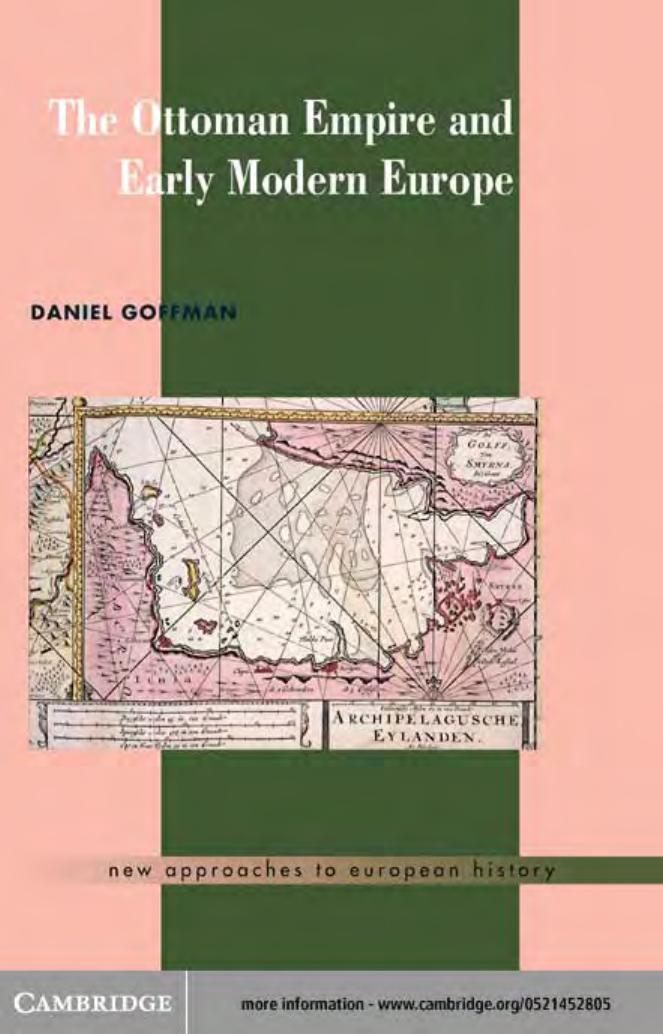The Ottoman Empire and Early Modern Europe by Daniel Goffman

Author:Daniel Goffman [Goffman, Daniel]
Language: eng
Format: epub, pdf
Tags: History, General, Europe, Middle East, Medieval
ISBN: 9780521459082
Google: 3uJzjatjTL4C
Publisher: CambridgeUP
Published: 2002-04-25T20:31:55+00:00
Map 7
When Andrea Doria, the Genoese commander of the combined Catholic fleet, retreated to the Sicilian port of Messina after a brief skirmish, Sultan Süleyman ordered an attack on the Venetian island of Corfu, which lies opposite Otranto at the mouth of the Adriatic Sea. This operation was completely seaborne and thus exposed Barbarossaâs flank; he could not depend upon direct strategic support from Ottoman Albania. In addition, he encountered an innovative defense â squat and broad walls engineered expressly to absorb the force of Ottoman artillery. The invasion failed. Then in the following summer Barbarossa turned to the Aegean archipelago with much better results. Here he took the island cluster of Naxos and several other Venetian isles and pillaged towns along the coastlines of Venetian Crete.
The major battle of this war was fought at sea in 1538, off the coast of Préveza. Andrea Doriaâs fleet perhaps was larger than the Muslim one, but was disadvantaged because it had to perform in Ottoman coastal waters. With his galleysâ backs defended and his crews replenished and kept fresh by the Ottoman units along the Albanian shores, Barbarossa could play a waiting game. The personnel of the enemy fleet, exposed on the open seas, gradually weakened. Reluctantly, Doria had to order a retreat, at which point the numerically inferior Ottoman fleet, with fresh oarsmen driven steadily forward by its pugnacious admiral, darted out and overtook the now bedraggled allied flotilla between Préveza and the island of Levkas on 28 September 1539.
In the ensuing engagement Doria found himself with neither the space to prevent the Ottomans from ramming his ships nor the winds to maneuver behind them. The consequence was a rout of the Catholic forces. Whereas thirty-six Alliance ships were captured, about 3,000 mariners enslaved, and Doria forced to flee ignobly to the haven of Corfu Town, Barbarossa lost not a single ship (ironically a storm two days later threw his fleet against the Dalmatian coast and wrecked sixty or seventy galleys). In the treaty that followed, Venice, the most reluctant ally, was the big loser. The Sultan Süleyman compelled the Serenissima not only to sign over to the Ottomans its fortresses along the Dalmatian coast but also to relinquish formally the Aegean islands that the Ottoman fleet had taken the previous summer.
The Pope and his allies had coerced an unwilling Venetian Senate into the war of 1537â39, from which Venice lost more than any other state. The ability of the Ottoman navy simultaneously to restrain a combined Catholic array and to overpower several Venetian fortresses and islands proved that the city-state no longer could mobilize a convincing military presence in the eastern Mediterranean. Its appearance in those seas would thereafter hinge upon the indulgence of the rival Ottoman state. In these circumstances, Venice was likely to drift into an accommodation with Ottoman ambitions and even to launch a metamorphosis toward the Ottoman âway.â The only alternative would have been for the âmistress of the seasâ to forsake its maritime empire. Venetian
Download
The Ottoman Empire and Early Modern Europe by Daniel Goffman.pdf
This site does not store any files on its server. We only index and link to content provided by other sites. Please contact the content providers to delete copyright contents if any and email us, we'll remove relevant links or contents immediately.
The European Opportunity by Felipe Fernández-Armesto(569)
The European History Highway: A Guide to Internet Resources by Dennis A. Trinkle Scott A. Merriman(535)
Morgan Kaufmann Digital Watermarking and Steganography by Ingemar Cox Matthew Miller Jeffrey Bloom Jessica Fridrich Ton(528)
The Seven Wonders of the Ancient World by Michael Denis Higgins(521)
Hyperculture by Byung-Chul Han(509)
European Security in a Global Context by Thierry Tardy(505)
European Security without the Soviet Union by Stuart Croft Phil Williams(504)
The Routledge companion to Christian ethics by D. Stephen Long Rebekah L. Miles(498)
Get Real with Storytime by Julie Dietzel-Glair & Marianne Crandall Follis(443)
Hudud Al-'Alam 'The Regions of the World' - a Persian Geography 372 A.H. (982 AD) by V. V. Minorsky & C. E. Bosworth(436)
Gorbachev And His Generals by William C. Green(428)
Tibetan Studies in Comparative Perspective by Chih-yu Shih Yu-Wen Chen(427)
Governance, Growth and Global Leadership by Espen Moe(417)
How Languages Are Learned 5th Edition by Patsy M Lightbown;Nina Spada; & Nina Spada(406)
CliffsNotes on Fitzgerald's The Great Gatsby by Kate Maurer(400)
The Oxford History of the World by Fernández-Armesto Felipe;(388)
The Egyptian Economy, 1952-2000 by Khalid Ikram(379)
Oral Poetry and Narratives from Central Arabia: The Poetry of Ad-Dindan : A Bedouin Bard in Southern Najd (Studies in Arabic Literature, Vol 17) (English and Arabic Edition) by P. M. Kupershoek P. Marcel Kurpershoek(365)
The Oxford Handbook of the Incas by Sonia Alconini(364)
